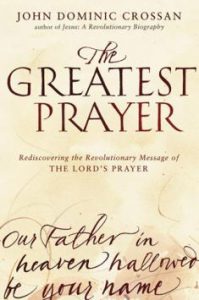The Greatest Prayer
By John Dominic Crossan (HarperOne, 2010)
 John Dominic Crossan, the eminent if controversial scholar of the Bible, is most well known through his work to uncover the historical core of the gospels. With this book, subtitled Rediscovering the Revolutionary Message of the Lord’s Prayer, however, he may become known as a spiritual writer as well.
John Dominic Crossan, the eminent if controversial scholar of the Bible, is most well known through his work to uncover the historical core of the gospels. With this book, subtitled Rediscovering the Revolutionary Message of the Lord’s Prayer, however, he may become known as a spiritual writer as well.
Crossan roots his analysis of the Lord’s Prayer in what he knows best: the Bible. By interpreting the Lord’s Prayer through the stories, prophets, and psalms of the Jewish scriptures, he discovers there “a revolutionary manifesto and a hymn of hope” that not only announces the biblical God’s call to justice but commits the one who prays it to that vision as well. For Crossan, as for the prophets before him, prayer and justice are two inseparable sides of the same coin.
Crossan analyzes the Our Father by breaking it down into its six basic phrases, with the first three speaking of God’s name, kingdom, and will, and the second three of the human realities of bread, debt, and temptation.
The first triad reminds us, who pray the Lord’s Prayer, of who God is: the Divine Householder. The second summons us to become who we are called to be: daughters and sons in that household. As such, we participate with God in what Crossan calls “the Great Divine Cleanup of the Word,” “enough human food for today, no human debt for tomorrow, and the absence of human violence always.”
Crossan’s focus on distributive justice as the heart of Christianity’s foundational prayer may be too earthbound for some, but his case is so deeply rooted in the Bible that even his harshest critic must admit Crossan is on to something. “Think now,” he asks of his connection of prayer and justice, “Have you ever seen a one-sided coin?”
Crossan’s reflections also reveal something that may surprise his detractors: a man of profound and challenging faith, who in his efforts to demystify Jesus has called us all back to the core of the gospel message.













Add comment